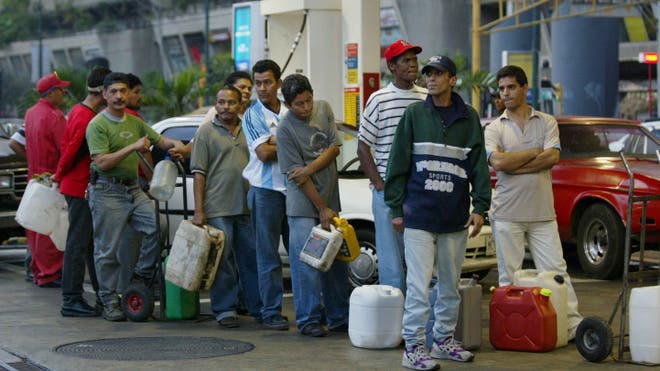The Success of Chavez's Bolivarian Revolution
"We're at the start of an unprecedented humanitarian crisis in this part of the Amazon."
"We're already seeing Venezuelan lawyers working as supermarket cashiers, Venezuelan women resorting to prostitution, indigenous Venezuelans begging at traffic intersections."
Col. Edvaldo Amaral, civil defense chief, State of Roraima, Brazil
"It's hard to see a solution to this problem because hunger is involved."
"Venezuela doesn't have enough food for its people, so some are coming here."
Altemir Campos, mayor, Pacaraima, Brazil
"It was worth the risk. [We Venezuelans] are going after one thing -- food."
"They all [people of Curacao] say, 'You are from Venezuela. You are from a rich country that has everything."
"And I say, 'No longer'."
Roymar Bello, 30, Willemstad, Curacao
 |
| Venezuelan migrants boarding a smuggler’s boat that will take them to the island of Curaçao. Credit Meridith Kohut for The New York Times |
It's difficult for the people on small Caribbean islands close to Venezuela who were accustomed to seeing better-off Venezuelans spend tourism dollars on Aruba and Curacao, to understand that the people they once envied are now starving. That wealthy Venezuela, that once represented as the most economically favoured in their region is no longer to be envied, but pitied. They have lately been inundated by desperate Venezuelan refugees, hoping to find food, employment.
Where once they hosted people able to generously pay their way, both island states have now sealed their borders to Venezuelans who are newly poor. They may enter, but only once they can show they have $1,000 in cash to enable them to fend for themselves. That $1,000 represents over five years of earnings reflecting a minimum-wage job. Patrols and deportations have increased, with Aruba using a stadium to hold up to 500 Venezuelan migrants caught by authorities.
 |
| Getty Images |
Socialist Venezuela has fallen into total ruin, people are hungry and there is no food to be had for people with scant money to spend it on. An estimated 200,000 Venezuelans have departed their country in the past year and a half in hopes of finding a place for themselves where there is food available, where they can find work, where medicine can be relied upon, and where they can escape the endemic crime waves and violence roiling their country.
Venezuelans are taking to the sea to undergo perilous journeys, away from their oil-rich country where poverty reigns supreme. "It has all totally changed", Ivan de la Vega, a sociologist at Simon Bolivar University in Caracas stated. "The earnings of these people are low. The only option left to them is the nearby countries, ones they can get to on foot, or by rafts, or go on boats with tiny motors."
 |
Those tiny motors are no match for the open water, and some never make it to their destination, and are mourned by those left behind. In Venezuela, inflation is set to hit 500 percent this year, 1,600 percent in 2017. The International Monetary Fund estimates that shrinking salaries have created a new demographic of poor Venezuelans, their professional careers abandoned for lives abroad working at menial tasks for scant reward, yet an improvement over their lives in their home country.
 |
Reinier Salazar, a 30 year old Venezuelan industrial engineer, moved to Brazil where he now cooks at a fast-food restaurant, earning about $400 monthly, a substantial increase from what he earned in his profession in Venezuela. "Venezuelans like myself are coming to Brazil for a simple reason; it's easier to survive here", he explained.
Since 2014, 30,000 Venezuelans migrated to the region bordering Venezuela where the Brazilian state of Roraima lies. Some migrants pay smugglers $1,000 each person to take them to Manaus and Sao Paulo. Others are just able to cross the border into Brazil. In a small Brazilian border town, entire families sleep on the town's streets, while their children enrol in local schools.
Labels: Economy, Migrants, Revolution, Social Dysfunction, Venezuela

<< Home